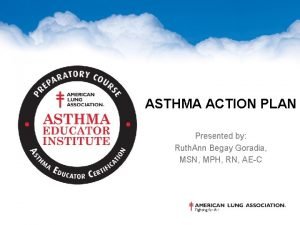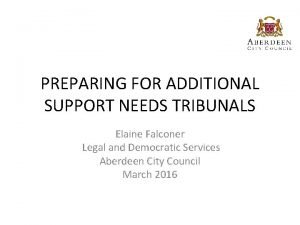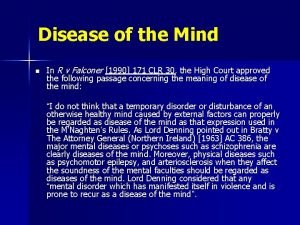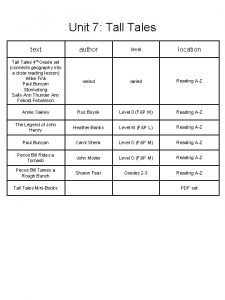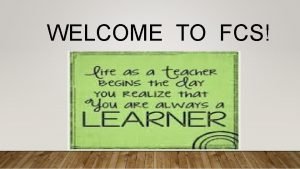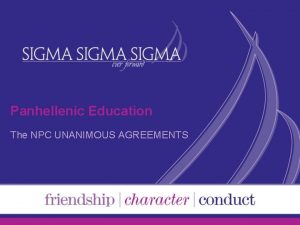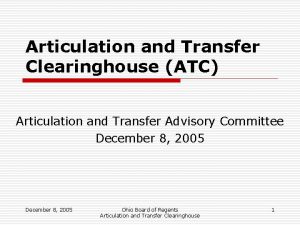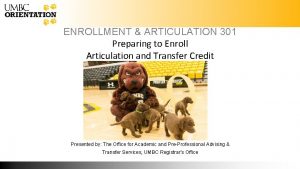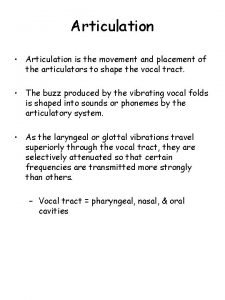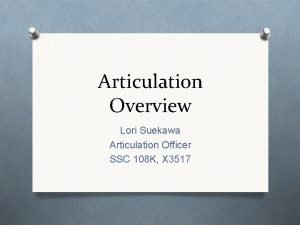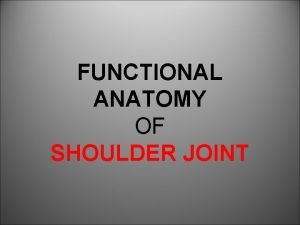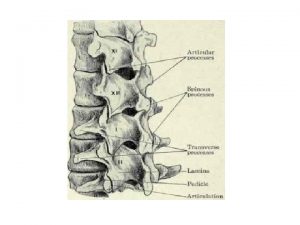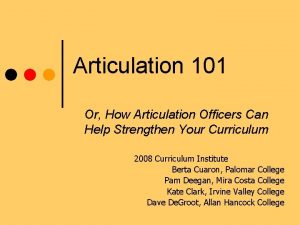Articulation Agreements and Career Tech Ruth Ann Falconer














- Slides: 14

Articulation Agreements and Career Tech Ruth Ann Falconer Nancy Dawson Columbus State Community College EMIS 1 -Day CTE Conference October 19, 2018 Tolles CTC

What is an Articulation Agreement? • An articulation agreement is an agreement between two institutions which allows students to obtain credit for learning achieved at one level of education toward a degree or credential awarded at a higher level. (high school/career center to 2 - or 4 -year college)

Types of Career-Technical Articulated Credits • • • Bilateral Articulations Career Technical Assurance Guide CTAG (sometimes called CT 2) An agreement between a specific secondary career-technical program and a state college • Negotiated locally by high school and college faculty for the institutions involved • Both secondary and post-secondary courses must be approved by ODHE through CEMS Credit earned may only be applied to the specific college program identified in the agreement • Credit is awarded upon enrollment into the postsecondary program. Credits typically appear on first transcript issued after first college course (varies per college) Negotiated by multiple representatives of secondary and post-secondary programs from across the state as facilitated by ODHE. • Credit earned may be applied to any state 2 - or 4 -year college or university • Credit is awarded upon enrollment into a post-secondary program Credit shows on transcript as non-native credit • Credit shows on transcript as non-native credit Statewide agreement applicable to any state-approved career technical secondary program and state 2 - or 4 -year college

Types of Career-Technical Articulation Credits College Credit Plus • To participate, a student must be registered and accepted in a particular college prior to the start of the CC+ course • CC+ courses may be taken online, at the college or at the high school • Courses may be taught by college faculty or by a high school instructor qualified to award college credit. • High school and college credit is awarded for work completed in a CC+ course • Credit is awarded by the college upon completion of the course just as for any college student • Credit is transcripted--appears as a grade on the college transcript

Which one? • Career Technical Programs may have a mixture of articulated agreement types: • • Course 1 – CTAG agreement Course 2—Bilateral Agreement Course 3—CC+ Course 4—no articulation

How can students access credits earned through a bilateral agreement? • Each college is different. Check the agreement to see the process that has been defined. • Note that articulation agreements do expire! • Suggestion: Have teachers complete documentation for each student as a task on their end-of-year checkout. Keep a copy in the student’s record, give a copy to the student, and forward a copy to the college.

• • • How can students access credits earned through CTAGs? Be sure your school completes the approval process described on the ODHE website (affirmation or full submission). Students must complete Parts I and II of the form and give to the instructor. The instructor must complete Part III. The form is then signed and sealed by an administrator. All parts of the form are sent by the secondary school to the college that the student plans to attend. CTAG forms cannot be hand carried by the student. ODHE has a list showing the name of the person at the college who should receive the forms. Recommendation: Have completion of the CTAG form added as part of the teachers’ end-of-year checkout.

CTE-26/Program of Study • • A minimum of 4 courses for the program (excluding capstone courses) • • Must have a minimum 3 hours of college credit available for students to earn Only include course codes listed under a program code. Program code list has been updated on ODE website. All secondary AND college courses (academic and career technical) within a pathway must be listed on the course tab. • • Possible change for FY 2020 submission: High school academic courses may not need to be entered. On the Pathway Tab, a minimum 3 semester hours of post-secondary credit must be shown (including CTAG, Bilateral, or CC+) • Possible change for FY 2020 submission: CTAGs may be automatically populated

Answers to Common CTE-26 Questions If I have two programs that fall within the same Pathway code, do I need two CTE-26 s? Example: Small Animal Care and Vet Tech • As long as they are in the same building (same building IRN), only one CTE-26 is needed. Suggestion: Add a comment on the Comment Tab to clarify what programs the CTE-26 will cover. • You only have to show the pathway for one of the programs.

Answers to Common CTE-26 Questions • If our district decides to change the courses that we offer within a pathway, do we need to submit a new CTE-26? • No new CTE-26 is needed provided the pathway stays the same and the building IRN does not change. • CAUTION: Changing the courses offered in a pathway mean that the articulation agreement will need to be changed/modified. Be sure to contact your partner college when making changes to the courses being offered.

Answers to Common CTE-26 Questions • We didn’t have enough enrollment to offer our CTE Program this year. OR • We had EMIS errors so our program did not get funded this year. Do we need another CTE-26? • CTE-26 s are valid for 5 years. Even though you did not have an ODE approved course this year, the CTE-26 is still in effect and does not need to be renewed until the year when the career field is due for renewal (as identified on the renewal chart).

Answers to Common CTE-26 Questions • We started a new program last year and submitted our CTE-26 then. This year, the career field is scheduled for renewal. Do we still have to complete a CTE-26? • Yes, a new CTE-26 must be completed. This will put your program on the 5 -year renewal cycle.

Answers to Common CTE-26 Questions • Do we have to involve the CTPD when starting a new program? • It is recommended that you work with the CTPD while planning a new CT program. The CTPD superintendent must review and approve/disapprove the CTE-26, so having someone from the CTPD involved in the planning will make this a much smoother process. • Do we have to work with the Tech Prep Coordinator when submitting a CTE 26? • The Tech Prep Coordinator will be reviewing the CTE-26 and must approve/disapprove it. So having him/her involved in the CTE-26 development will make for a smooth process.

Need Help? Tech Prep Coordinators are located among 6 regions across the state and are well qualified to assist you with the following: • • Completion of the CTE-26 • • Information regarding new course rollouts Approval and submission of CTAG documents Development of bilateral agreements Identification of post-secondary programs throughout the state by coordinating with other TP coordinators Each region provides professional development opportunities for both individuals and groups. Check TP website in your area for a calendar of events. To contact your Tech Prep Coordinator, go to http: //education. ohio. gov/Topics/Career-Tech/College-Tech-Prep/Regional-Center. Points-of-Content
 Daniel gilmour
Daniel gilmour Ruth ann begay
Ruth ann begay Low tech and high tech assistive technology
Low tech and high tech assistive technology Incision tipo falconer
Incision tipo falconer Elaine falconer
Elaine falconer R v falconer (1990)
R v falconer (1990) Reel shadows of the indignant desert birds.
Reel shadows of the indignant desert birds. Davy crockett and the frozen dawn
Davy crockett and the frozen dawn William shakespeare anne hathaway poem
William shakespeare anne hathaway poem Oklahoma career tech programs
Oklahoma career tech programs Fcs lanchpad
Fcs lanchpad Formulas for career success
Formulas for career success Enlarging the pie
Enlarging the pie Yalta conference agreements
Yalta conference agreements Npc unanimous agreements
Npc unanimous agreements

